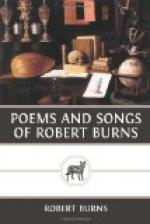I’ve been at drucken
writers’ feasts,
Nay, been bitch-fou
’mang godly priests—
Wi’ rev’rence
be it spoken!—
I’ve even join’d
the honour’d jorum,
When mighty Squireships
of the quorum,
Their hydra drouth did
sloken.
But wi’ a Lord!—stand
out my shin,
A Lord—a
Peer—an Earl’s son!
Up higher yet, my bonnet
An’ sic a Lord!—lang
Scoth ells twa,
Our Peerage he o’erlooks
them a’,
As I look o’er
my sonnet.
But O for Hogarth’s
magic pow’r!
To show Sir Bardie’s
willyart glow’r,
An’ how he star’d
and stammer’d,
When, goavin, as if
led wi’ branks,
An’ stumpin on
his ploughman shanks,
He in the parlour hammer’d.
I sidying shelter’d
in a nook,
An’ at his Lordship
steal’t a look,
Like some portentous
omen;
Except good sense and
social glee,
An’ (what surpris’d
me) modesty,
I marked nought uncommon.
I watch’d the
symptoms o’ the Great,
The gentle pride, the
lordly state,
The arrogant assuming;
The fient a pride, nae
pride had he,
Nor sauce, nor state,
that I could see,
Mair than an honest
ploughman.
Then from his Lordship
I shall learn,
Henceforth to meet with
unconcern
One rank as weel’s
another;
Nae honest, worthy man
need care
To meet with noble youthful
Daer,
For he but meets a brother.
Masonic Song
Tune—“Shawn-boy,” or “Over the water to Charlie.”
Ye sons of old Killie,
assembled by Willie,
To follow the noble
vocation;
Your thrifty old mother
has scarce such another
To sit in that honoured
station.
I’ve little to
say, but only to pray,
As praying’s the
ton of your fashion;
A prayer from thee Muse
you well may excuse
’Tis seldom her
favourite passion.
Ye powers who preside
o’er the wind, and the tide,
Who marked each element’s
border;
Who formed this frame
with beneficent aim,
Whose sovereign statute
is order:—
Within this dear mansion,
may wayward Contention
Or withered Envy ne’er
enter;
May secrecy round be
the mystical bound,
And brotherly Love be
the centre!
Tam Samson’s Elegy
An honest man’s the noblest work of God—Pope.
When this worthy old sportman went out, last muirfowl season, he supposed it was to be, in Ossian’s phrase, “the last of his fields,” and expressed an ardent wish to die and be buried in the muirs. On this hint the author composed his elegy and epitaph.—R.B., 1787.
Has auld Kilmarnock
seen the deil?
Or great Mackinlay^1
thrawn his heel?
Or Robertson^2 again
grown weel,
To preach an’
read?
“Na’ waur
than a’!” cries ilka chiel,
“Tam Samson’s
dead!”




